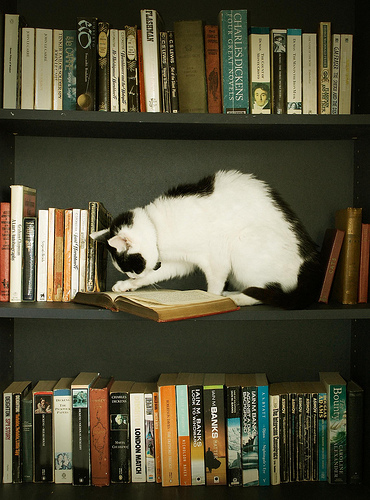One of the greatest joys of language learning is being able to read. Being bilingual means twice as many stories, twice as much joy – from reading in two languages. But the day-to-day practice of this is a bit more complicated. So what does your reading look like, polyglots? And what could it look like?
1. Recommended reading
Just in case my previous blog posts haven’t made that clear: I want you to read lots if you’re serious about language learning. I want you to keep reading and make a habit of reading something as often as you can. This is not just a great way to pick up new vocabulary – it’s also a brilliant means to finding good company for the words you already know. Context and collocation make learning a lot more meaningful – and reading is an easy way to pick up new contexts and new collocations.
Don’t get me wrong: all skills are important when it comes to learning languages. But in the pursuit of “being able to speak well,” teachers and learners often tend to favour the listening and speaking duo – and neglect the reading and writing. As it turns out, the practice is not confined to language education.
2. The decline of “deep reading”
This is bad news, but in a way, it’s not really surprising. Wired reports that e-readers and electronic devices may lead to our reduced ability to engage in deep, extensive reading. We skim, summarise, scroll and get the “gist of it” better than ever – but fail to really read into a text. (Incidentally, Wired points to studies that show how good paper is for that kind of serious engagement with the text.)
For language learners, this is a symptom echoed in the proliferation of “get-fluent-quick” learning methods. It’s easy to focus on vocabulary and speaking/listening – because these things feel nice, are instantly produced, quickly learned and easy to test. The biggest drawback of a system like Duolingo is, to my mind, the lack of focus on extensive reading. This, in turn, leads to the belief that a handful of words and some frequently found verbal exchanges amount to fluency (a myth criticised frequently by my colleagues on the Intertubez).
3. “But I don’t really need to read anyway, so-“
I think that’s a very bad way to treat a language. A rude, condescending and somewhat brutish way.
I’m going to gloss over the fact that you’re missing on things in your mother tongue – and just focus on the way you want to learn your language if reading is to be skipped.
You’re missing out, and you’re holding back. Let me explain:
You’re missing out, because by not reading you will not be exposed to anything that’s not there and then, spoken and present. You will rely only on things you can hear. Every foreign language exchange will have to revolve around something you say. This means – for the large part – the safe, close and immediate things in the present. No history to the places you visit. No other points of view. No broader context. Like a speech bubble without a picture around it.
You’re holding back, because you’re not realising your full potential in the language you’re learning. The words you pick up will never find out new contexts and places for themselves. The ideas you have will not go beyond this conversation, and then the next. Your stories will only be about you and the things you did. Your point of view will be less informed. You will not be the ideal conversation partner.
Hey, guess where this is heading…
By focusing purely on learning to speak a foreign language, you’re limiting your options and becoming slowly isolated from fresh ways to practice speaking. In short: you’re painting yourself into a speaking-dominated corner.
4. Five good things to read today
This article is a quick guide to speed reading – just don’t get too obsessed about it, and make sure the skills actually get used!
This blog post of mine is a guide to slow reading – and why you should care about this as well.
This is Project Gutenberg – a great source of free literary works in several languages.
BBC offers news in several languages as well – read up on what is happening in the world.
This is Interpals – a community of pen pals. Nothing’s nicer to read than a letter!
5. So how do you read, then?
Let us know of your good reading habits – hit the comment section below and give us your tips!
(Photo credit: Apionid via Compfight)
Wiktor (Vic) Kostrzewski (MA, DELTA) is an author, translator, editor and project manage based in London. When he works, he thinks about languages, education, books, EdTech and teachers. When he doesn’t work, he probably trains for his next triathlon or drinks his next coffee.
BRAVE Learning (formerly known as 16 Kinds) is a lifelong learning and productivity blog. If you enjoy these posts, please check out one of my books and courses.
My recent publications, and my archive, is now all available on my new project: PUNK LEARNING. Hope to see you there!


